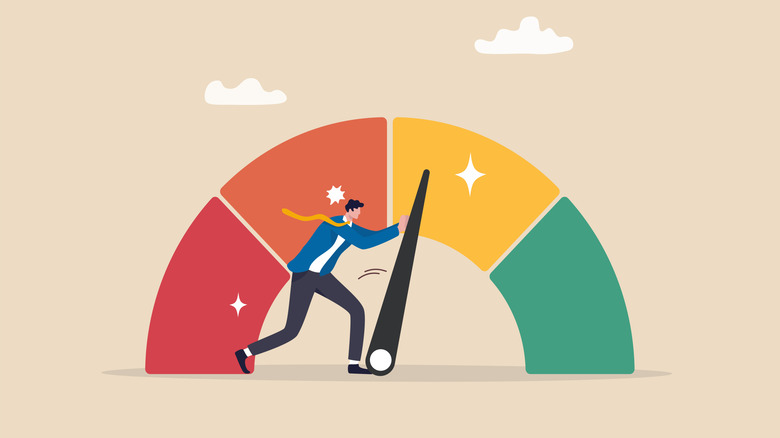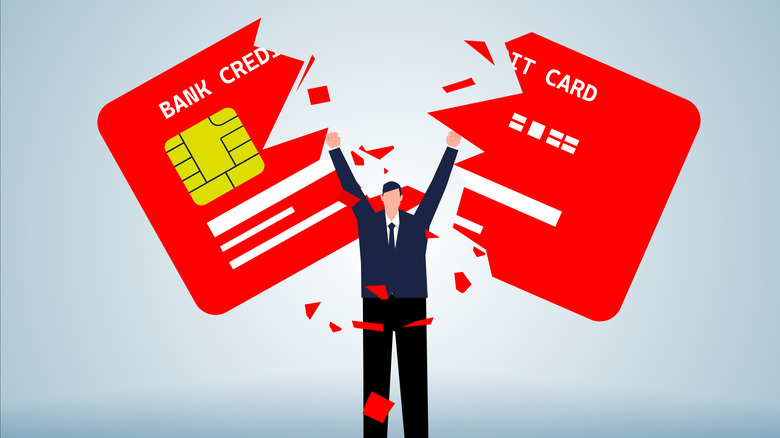If Your Credit Score Is Above This Number, You Have The Average Credit Score Of A 30 Year-Old
Credit scores are weird and wild things. The concept seeks to pin down a borrower's 'creditworthiness' into a single, comprehensive number that tells a lender all they supposedly need to know. However, in reality, there's far more to a loan or credit card application than simply providing a credit score, and failing to meet certain baseline figures can be problematic for those looking to finance important life events. For instance, while FHA loans are available to home buyers with low credit scores they still require at least a score of 500 to be eligible. Plus, better scores unlock better interest rates, both in FHA and conventional loans. So, even though there's a lot more to a person's financial standing than their credit score, it's still an important benchmark to focus on. As you age, your score does tend to trend upward, with those in their 30s sporting an average score of 691 (up from 680 among those aged 18 to 29).
A 691 is a 'good' score based on most models, with 'excellent' positioned at the top, and 'very good' below that. A score nearing 700 indicates good financial management habits, but it's also a decent way from the pinnacle of credit scores. As a result, those who have achieved scores in this range still have plenty to strive for as they continue to manage their personal finances and work toward larger monetary goals.
Chasing a high credit score can help in other areas, too
Achieving a good or even very good credit score is an important financial milestone for people looking to borrow money to buy a car or invest in their first home. While credit history plays an important role in these kinds of tasks, reaching this number — and maintaining it — can unlock significant financial benefits. If your score is at or above the average mark for people in your age group, it means that you're doing things right, for the most part. Remember that borrowing money is central to establishing and growing your credit history, meaning that using a credit card, or applying for a personal or student loan starts this process. Then, as you continue to manage these tools responsibly your score will grow. Getting a larger line of credit, and not using it, also improves your score while closing an old account or lowering your card limit can actually reduce it.
Navigating these decisions revolves around managing your debt load responsibly. If you start splurging with a credit card, your score can ultimately take a hit as a result of a rising utilization rate. As a result, good card management correlates to better financial mobility all around. Those with higher scores tend to have more room in their budget to save for their future, or even to splurge occasionally on targeted purchases that will enrich their life.
Raising your credit score is all about strategy and follow through
If you want to raise your credit score, you need to start with your credit cards. Credit card interest rates are almost certainly the highest of any debt product you'll encounter. This makes them a prime target for a renewed focus on debt management. Paying off your credit cards will ultimately help improve your credit score. This is because two crucial factors play a central role in your score's calculation — your utilization rate (the percentage of your total credit limit that has been used), and your total available credit. These are essentially two sides of the same coin. As you pay off your debts, your available credit will rise and your utilization rate will drop.
Those who have become reliant on credit cards often have a hard time making an impactful change here. So the best approach is to go cold turkey. Pay the minimum on your cards for a month or two and shift over to paying for everything in cash — you might even consider cutting up your cards if the temptation is particularly great. Once you've created enough buffer space in your budget, start paying down your balances without adding new spending on your accounts. This will gradually move the needle in the right direction on both key elements in credit score arithmetic. Even if you can only afford to make minimum payments, halting the use of your cards can go a long way to building better credit over the long term.


